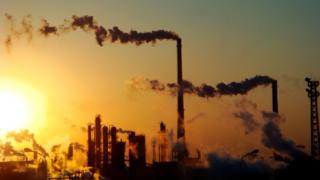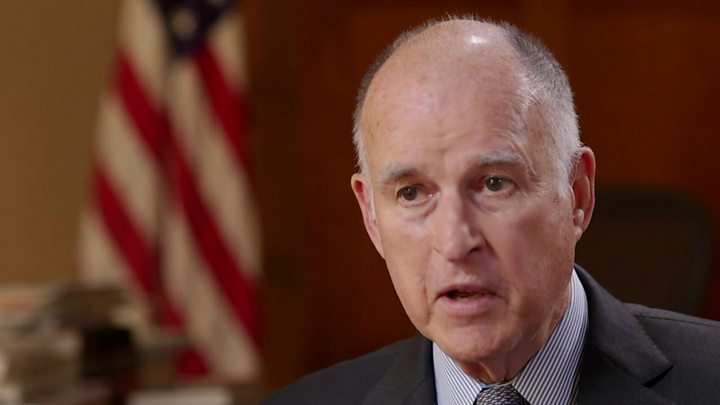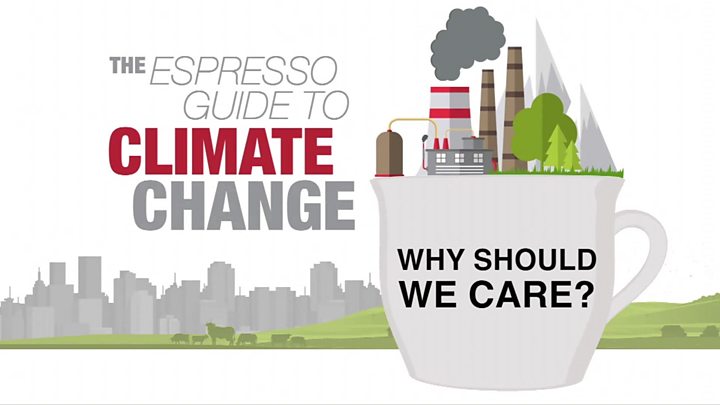 Image copyright
Image copyright
EPA
China’s premier earlier said his country would honour its commitments on climate change
The US has been urged to remain committed to the 2015 Paris climate agreement ahead of an announcement by President Donald Trump on the issue.
Reports in the US suggest Mr Trump will withdraw the US from the deal.
UN Secretary General Antonio Guterres said that as the world’s largest economy, US support was crucial.
Meanwhile, Chinese and EU leaders are set to agree a joint statement backing the Paris agreement, saying it is “an imperative more important than ever”.
The statement – a draft of which has been seen by the BBC – says rising temperatures affect national security and increase “social and political fragility”, while the transition to clean energy creates jobs and economic growth.
Mr Guterres told the BBC: “It is obviously a very important decision as the United States is the biggest economy in the world.
“But independently of the decision of the American government, it’s important that all other governments stay the course.
- Why does Trump want to leave climate deal?
- What is climate change?
- What is the Paris climate agreement?
“The Paris agreement is essential for our collective future and it’s also important that American society – like all other societies, the business community – mobilise themselves in order to preserve the Paris agreement as a central piece to guarantee the future of our children and grandchildren.”
What might Trump announce? Analysis by the BBC’s Anthony Zurcher in Washington
The decision is a bit more complicated than a simple thumbs-up, thumbs-down.
If the president opts to withdraw, how he does it will be almost as interesting as the decision itself. Here are his primary options:
- Give notice of an intent to withdraw. The formal process takes a year and can’t start until November 2019
- Withdraw from the Framework Convention on Climate Change – the 1992 Senate-ratified treaty upon which all subsequent climate agreements have been built. This also requires one year’s notice, but it can be triggered immediately
- Stay in the agreement, but ignore the non-binding greenhouse-gas emission targets and international aid obligations
- Determine that the Paris Agreement is a treaty that should have been ratified by Congress. Submit it to the Senate, where it will languish. Or don’t. Either way, the agreement dies
Then again, the president could just opt to stay in the agreement, making all this hoopla either a cunning move to gain the upper hand in negotiating with European allies, or just an elaborate bluff.
China to stick with deal
Chinese Premier Li Keqiang has said his country will honour its commitments on climate change.
Speaking on a visit to Germany, he said fighting climate change was in China’s own interests.
“China will continue to implement the promises made in the Paris accord. But of course we also hope to do this with the co-operation of others,” Mr Li said.

As a big developing country, China had an “international responsibility” to try to prevent climate change, he added.
China overtook the US as the world’s biggest emitter of greenhouse gases in 2007.
Russia also said it would stick to its climate commitments, but said the Paris agreement would be affected by a US pullout.
“It goes without saying that the effectiveness of this convention is likely to be reduced without its key participants,” a Kremlin spokesman said.
Mr Trump’s refusal to commit to the Paris agreement caused frustration at a G7 meeting last week, with German Chancellor Angela Merkel describing the discussion as “difficult, not to say dissatisfying”.
What would US withdrawal do? Analysis by BBC environment correspondent Matt McGrath
There’s no doubt that if the US pulls out, it will make it more difficult for the world to reach the goals that it set for itself in the Paris agreement. The US contributes about 15% of global emissions of carbon, but it is also a significant source of finance and technology for developing countries in their efforts to fight rising temperatures.

There’s also a question of moral leadership, which the US will be giving up, which may have consequences for other diplomatic efforts.
Michael Brune, from US environmentalist organisation the Sierra Club, said the expected withdrawal was a “historic mistake which our grandchildren will look back on with stunned dismay at how a world leader could be so divorced from reality and morality”.
What was agreed in Paris?
Climate change, or global warming, refers to the damaging effect of gases, or emissions, released from industry and agriculture on the atmosphere.
The Paris accord is meant to limit the global rise in temperature attributed to emissions.
Countries agreed to:
- Keep global temperatures “well below” the level of 2C (3.6F) above pre-industrial times and “endeavour to limit” them even more, to 1.5C
- Limit the amount of greenhouse gases emitted by human activity to the same levels that trees, soil and oceans can absorb naturally, beginning at some point between 2050 and 2100
- Review each country’s contribution to cutting emissions every five years so they scale up to the challenge
- Enable rich countries to help poorer nations by providing “climate finance” to adapt to climate change and switch to renewable energy
To date, 147 out of 197 countries have ratified the accord, including the US, where it entered into force last November.
Trump urged to retain Paris climate deal by UN chief}

